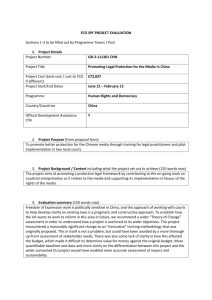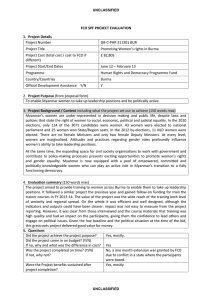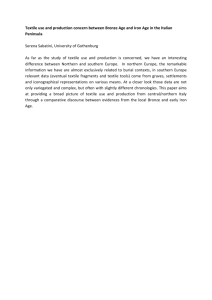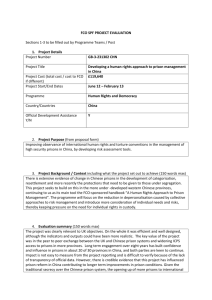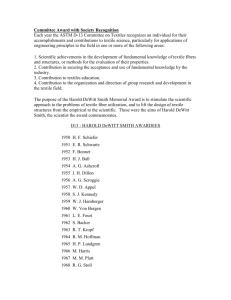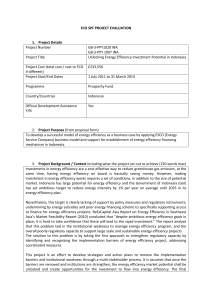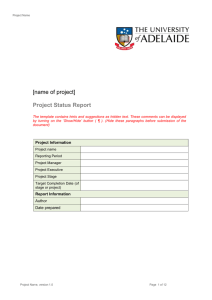HRDD evaluation - human rights in the Chinese textile
advertisement
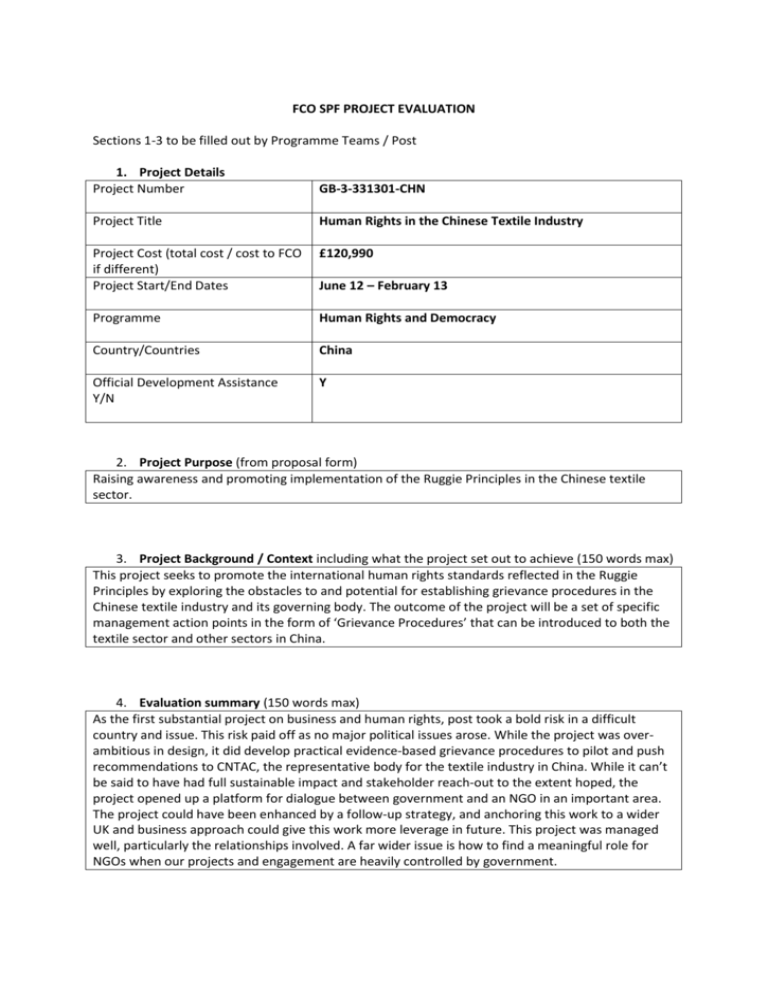
FCO SPF PROJECT EVALUATION Sections 1-3 to be filled out by Programme Teams / Post 1. Project Details Project Number GB-3-331301-CHN Project Title Human Rights in the Chinese Textile Industry Project Cost (total cost / cost to FCO if different) Project Start/End Dates £120,990 Programme Human Rights and Democracy Country/Countries China Official Development Assistance Y/N Y June 12 – February 13 2. Project Purpose (from proposal form) Raising awareness and promoting implementation of the Ruggie Principles in the Chinese textile sector. 3. Project Background / Context including what the project set out to achieve (150 words max) This project seeks to promote the international human rights standards reflected in the Ruggie Principles by exploring the obstacles to and potential for establishing grievance procedures in the Chinese textile industry and its governing body. The outcome of the project will be a set of specific management action points in the form of ‘Grievance Procedures’ that can be introduced to both the textile sector and other sectors in China. 4. Evaluation summary (150 words max) As the first substantial project on business and human rights, post took a bold risk in a difficult country and issue. This risk paid off as no major political issues arose. While the project was overambitious in design, it did develop practical evidence-based grievance procedures to pilot and push recommendations to CNTAC, the representative body for the textile industry in China. While it can’t be said to have had full sustainable impact and stakeholder reach-out to the extent hoped, the project opened up a platform for dialogue between government and an NGO in an important area. The project could have been enhanced by a follow-up strategy, and anchoring this work to a wider UK and business approach could give this work more leverage in future. This project was managed well, particularly the relationships involved. A far wider issue is how to find a meaningful role for NGOs when our projects and engagement are heavily controlled by government. 5. Questions Did the project achieve the project purpose? Did the project come in on budget? (Y/N) If no, why and what was the difference in cost? Was the project completed on time? (Y/N) If not, why not? Were the Project benefits sustained after project completion? Yes Yes Yes Yes 6. Overall Red / Amber / Green rating for project Overall Rating for project (put X in relevant box) Red Red Amber Amber Green X Green Guide to overall rating: Green- project performed well under each of the evaluation criteria: relevance, efficiency, effectiveness, sustainability, impact and management Green/Amber – project performed well under most criteria and adequately in others Amber/Red – project performed adequately under some criteria but poorly in others Red – project performed poorly under most criteria 7. Top 5 Lessons learned 1) Projects that generate such good results through pilot activity need a more concerted follow up strategy. The scale of success is limited without this. 2) Being up-front about ambition by keeping project aims, outputs, and risks realistic is key – this makes it easier for M&E. 3) A frank assessment of likelihood of risks is required, especially in the context of China. 4) Human rights and business is a sensitive issue in China, especially labour concerns – but as long as this is handled and packaged carefully, a practical bottom-up approach can begin to open up policy space and address such issues with key stakeholders. 5) It is really difficult to engage with NGOs in China, especially as government acceptance and buy in is required to gain traction in projects – however, projects such as this need to ensure they find a way to keep NGOs engaged. 8. Recommendations for future projects This project has been successful in identifying and working with a key industry body. It has potential to be adopted by other sectors. However, there is a need to anchor this work to a wider UK strategy and take a tri-partite approach to reform in this area - government, business and civil society. This is especially the case given there is a strong link in this project area to UK business objectives. Getting a UK/China expert to explore possibilities for future collaboration with Chinese business, and a political champion to pull it forward, could be one way. Why human rights in the work-place makes business sense (stable and loyal workforces) was identified by CNTAC as a strong driver, alongside consumer driven ethical demands.
